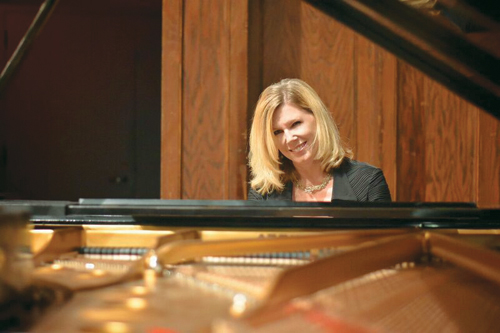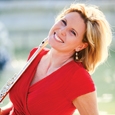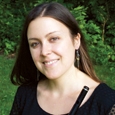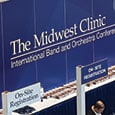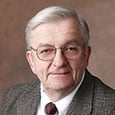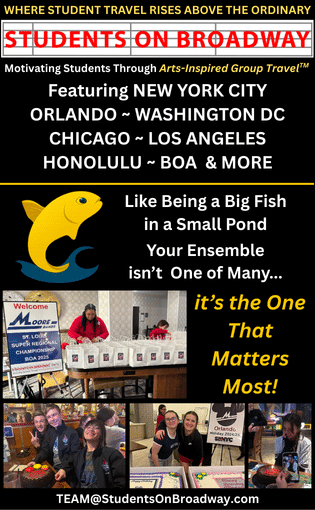Sharon Sparrow is the assistant principal flute of the Detroit Symphony Orchestra and recently wrote a book on preparing for successful auditions.
Sharon Sparrow has been a member of the Detroit Symphony Orchestra since 1997. In 2014 she was appointed and tenured as assistant principal flute. She has also performed with the Chicago Symphony, Pittsburgh Symphony, Baltimore Symphony, Seattle Opera Orchestra, Memphis Symphony, Fort Wayne Philharmonic, and Hong Kong Philharmonic. She is currently the flute instructor at Wayne State and Oakland University and presents clinics throughout the United States. In 2016, her book Six Weeks to Finals: The complete system for Audition Success was published by Theodore Presser. A dedicated advocate of musical education, Sparrow strives to promote awareness and enjoyment of classical music, especially with children. She has written and hosted children’s shows for both the Cuttime Players and the Detroit Symphony, and regularly performs in local schools, hospitals and retirement centers as part of the DSO’s Community Enrichment program. Sparrow is a graduate of The Juilliard School (BM, Julius Baker) and Mannes College of Music (MM, Thomas Nyfenger) and also studied with Geoffrey Gilbert.
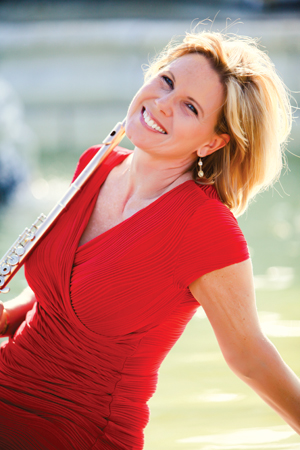
What were your early musical studies?
I began piano lessons when I was five. In the fifth grade, I wanted to play in the band. Since percussion (especially bells) was the most similar to piano, that is what I wanted to play. However, in those days only boys were allowed to play percussion, so I chose the flute because it was small and portable. I had a rough start and in the sixth grade sat 23rd chair out of 23. Then the band director switched me to oboe because I could read music so well. I had a horrible relationship with the oboe and decided to really apply myself to the flute. My first private teacher helped me immensely. She was a junior in high school and was a beautiful person inside and out. I wanted to be just like her. She promised me that if I learned all my scales, arpeggios, and etudes, she would assign me the Chaminade Concertino for solo and ensemble festival when I was a freshman in high school. My next teacher was John Oberbrunner, principal flute of the Syracuse Symphony. He was an experienced teacher with many successful students, including Sandra Church of the New York Philharmonic. He is the one who inspired me to go to Conservatory. Although the whole time I was studying with him, I was really torn between becoming a flutist or a pianist.
Why did you choose flute over piano?
I chose flute because it is an instrument you can always play in a group. Following my senior year in high school, I attended my first orchestral summer camp as a flutist, and the experience of playing in that orchestra was intoxicating! At the time, I just felt so much more isolated playing piano.
What were your college experiences?
After high school, I attended SUNY Purchase in a program where you were allowed to seek a teacher on your own. Since the school was very close to New York City, I played for Julius Baker, but he did not take me as a student right away. In the meantime, he arranged for me to study with Alan Cox, an amazing teacher who started me on long tones, vocalization techniques, and Taffanel et Gaubert. He also introduced me to recordings of singers – people like Dietrich Fischer-Dieskau. I remember a lesson on the Schubert variations where he taught me to play the theme in a way that changed my life and how I heard music. In about eighteen months, Baker began teaching me at his home in Brewster, New York. After my sophomore year, I transferred to The Juilliard School to continue my studies with Baker.
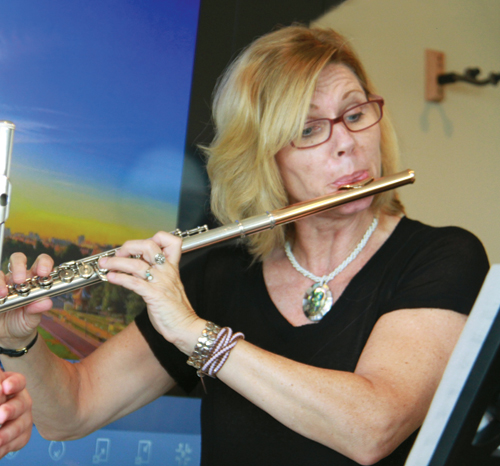
What were Baker’s strengths as a teacher?
He never had the philosophy of “be like me or play like me.” He saw your individual gift and encouraged you to bring it out. Mr. Baker taught me to sing through the instrument. I remember him constantly telling me to “SING, honey, SING!” When you were not singing through the flute, he would often pick up his flute and demonstrate. Those moments when he would play were incredibly inspiring.
What was the environment like at Juilliard?
It was incredible. I was so inspired by my peers – Sue Hoeppner, Marina Piccinini, Amy Porter, and many others who all brought something different to the instrument. When I was accepted, I felt I was pretty much bottom of the barrel and had no idea people could be this amazing on the flute. One of the most beneficial things was what I absorbed from hearing my classmates and then trying to figure out how they did what they did.
After graduating from Juilliard, what were your studies with Geoffrey Gilbert like?
Mr. Gilbert had twelve students from all over the world at a program in Deland, Florida. We had weekly masterclass, weekly studio class, and a private lesson with him. The students were very close and collegial so we often worked together. I also had the privilege of accompanying the other students at their lessons to help pay for my time there, so I absorbed a lot.
Gilbert’s teaching emphasis was mostly on technique. He felt if you were not a technical master on the instrument, you could not bring everything else that was required to it. He would accept nothing less than 100% in every area. Whatever I might have missed at Juilliard, I solidified for the rest of my life during that year. I can’t say it was enjoyable, but I appreciate having that bank of knowledge to draw on for my entire life.
He also had a very different concept of sound. At Juilliard, I had a certain concept of sound. To hear this other master teacher who had a completely different approach inspired me to think differently about colors, and reinforced that there is more than one way to make a sound on the flute.
What was the next step towards a career?
When I was in Florida, I became best friends with Linda Toote, who was at that time principal flute of The Florida Orchestra. She insisted that I leave Florida and do whatever it took to get a master’s degree with Thomas Nyfenger, her former teacher at Yale, so I auditioned and was accepted at Mannes, where I was able to study with him.
Nyfenger was absolutely brilliant as a person and as a musician. I will never forget my first lesson with him where I played the Karg-Elert Sonata Appassionata. After that lesson I thought I had never known anything about music until that hour. I had studied with great piano teachers and had been to Juilliard, but somehow, he opened my eyes to music making in a way that I had missed up until that point. We had a fabulous relationship, and I feel like I learned how to be a musician from him, in every way possible – how to phrase, how to color, and how to use the harmony to shape a phrase. It was not about the flute (although he knew better than anyone how to teach the logistics of playing the flute); it was about being a musician.
Does your teaching style reflect a blend of these three master teachers?
I was so fortunate to have access to those three completely different styles. I emphasize a solid foundation of technique with my students, like Mr. Gilbert. I am always telling them to “SING,” like Baker did, and I am constantly drilling into them how much the harmony matters and how they need to know the context to color a note and play a phrase like Nyfenger taught me.
What led you to write a book on auditioning?
I took a lot of auditions and found I was very inconsistent. I would make the finals one time and not get out of the prelims in another. I felt I was a solid player and knew the excerpts, but each audition seemed like a roll of the dice. Auditions are very different than playing a recital, going to school, practicing in the practice room or playing in an orchestra. When the Detroit Symphony job was advertised, I decided to develop a plan. It had to be efficient as I had two toddlers, a full-time orchestra job, and had just recovered from a debilitating illness.
I developed a system to incorporate not just practicing the excerpts, but to train the brain while training for the event. I realized that when I auditioned, I felt like it was someone else playing my flute. I needed to figure out a way to match practice performance to my audition performance. The goal was to take the mystery out of auditioning.
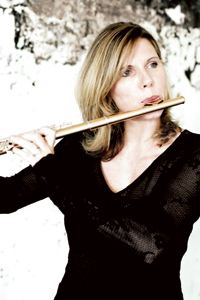
What are the basic concepts of your method?
While I offer ideas about practicing, I also focus on mental training and instruction on the art of taking auditions. Through the years, many excellent methods have been developed for honing your technical skills in the practice room; however, mental preparation and the actual practice of auditioning have been overlooked. The method is extremely organized and paced so you don’t get bored with the excerpts. It is important to find new ways to look at the excerpts musically and technically and to prepare in a way that will satisfy the audition committee. I have been on many audition committees and now understand what they are looking for in the candidates.
What are audition committees looking for?
They want to hear people play in tune, play in time, and play musically. Your musical idea might not match that of each member of the committee, but you have to have a knowledgeable musical intent for everything that comes out of your instrument. While the instructions play in time and play in tune sound obvious, many players think that they are doing this when they really are not.
What are some practice techniques to work on playing in tune, in time and musically?
Most of it has to do with recording yourself often and playing back your performance with a metronome and tuner. For example, record the Stravinsky Firebird Variation. Play it back with the metronome clicking. If the playback does not match the metronome especially in the rests, you are not playing in time. It is the same with the tuner. In the opening of Beethoven Leonore No. 3, for example, if your playback has out-of-tune notes, then you are not playing in tune. When you employ these techniques, you learn where your internal gauge is actually set and can make adjustments. The more times you do this, the better you will get. This method actually changes the way you hear yourself while you are playing.
The same goes for phrasing. I can think I am playing a beautiful phrase yet on playback I surprisingly might not hear anything happen at all. A lot of people record themselves, but when they listen without a metronome, tuner or a specific goal of what to focus on, they just hear the music the same way they thought it sounded while playing. They reassure themselves that everything is fine when it is not. Setting specific goals for each playback asks you to listen to yourself differently.
How can people overcome nervousness when auditioning and performing?
With the aid of sports psychology books, I studied athletes and their training methods. I also have worked with coaches who train individuals to find their full potential self. I believe in the visualization techniques that most suggest. For example, an excellent technique for musicians is to do a complete mock round, but without the instrument. Begin by closing your eyes, breathing deeply, and simulating an entire round in your head where you play each excerpt effortlessly and enjoyably. Positive self-talk is another key element. All words – spoken, written, or thought – should have a positive spin beginning at least six weeks before the audition.
These techniques can also help younger flutists preparing for auditions and performances. Most young flutists have not learned to use the fear and nervousness they encounter when performing to their advantage. I would start with several small excerpts from their piece because they are shorter in duration or perhaps certain sections from solo repertoire. Overcoming nervousness is not the issue, it is learning to use that feeling to your advantage that is the key.
What is your daily practice routine when not preparing for an audition?
The most consistent thing about my practice routine is long tones. I strongly believe in a long tone warm up along with some technique work every day. I practice them many different ways to keep it fresh. Beyond that it depends on how much time there is. I am always looking for the next most difficult etude. There is also a lot of prep time for upcoming recitals or for what is on my stand at the DSO.
What are you doing this summer besides performing with the DSO?
I will be teaching at the Interactive Flute Retreat, a non-competitive masterclass, located in this amazing house in South Haven on Lake Michigan. This year I am adding an Orchestral Excerpt Immersion Day. As part of the program I will give a recital. In the meantime, my colleague in the Detroit Symphony, piccoloist Jeff Zook and I are working on a duet version of the first Six Telemann Fantasias which will be published by Presser for the 2017 NFA Convention. Besides that, I will be touring in Asia for three weeks with the Detroit Symphony Orchestra.
For as long as I can remember, I wanted to pursue a career in music. Nothing else inspired or excited me as much as being part of a musical experience. Music was my passion from the youngest age I can remember. I did not come from a musical family, but I caught the bug from taking piano lessons. I can honestly say I am truly living the dream. I somehow worked my way up to a position in an amazing orchestra, and I have wonderful students. If anything, perhaps I am too immersed in it. I hardly have time for anything else because I have so much passion for every area of music. It is unending, what you can do.
